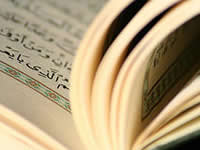 “Ramadan is the (month) in which the Qur’an was sent down, as a guide to mankind, also clear (signs) for guidance and judgment (between right and wrong).” (Qur’an 2:185)
“Ramadan is the (month) in which the Qur’an was sent down, as a guide to mankind, also clear (signs) for guidance and judgment (between right and wrong).” (Qur’an 2:185)
Aside from fasting, the importance of reflecting on the Qur’an, and reading it in its entirety if possible, is central to Ramadan. It was in this month that the revelation of the Qur’an to the Prophet Muhammad is said to have begun. For many busy Muslims who might not read the Qur’an regularly, Ramadan offers that opportunity to reconnect with a conduit that Muslims believe represents a direct relationship between humans and their Creator.
For most people who are not Muslim, however, their introduction to the Qur’an is somewhat different. It usually takes the shape of belligerent verses offered through soundbites as proof of Islam’s inherent violent and/or intolerant nature. Both Muslim extremists and those seeking to demonize Islam use the same tactics. This constant attempt to redefine the central theme of the Qur’an has had a corrosive effect on the relationships between Muslims and their neighbors.
Herein lies the problem of reading individual verses from holy books – and I mean any holy book, not just the Qur’an. If you see extremists citing religion to support their views, you will notice a common thread – their views are almost always backed by stand-alone verses, often from unreliable translations or taken out of context. It has long been said that the Devil can cite scripture for his purposes – and this is how he gets away with it.
Ramadan presents a perfect opportunity to take in the Qur’an chapters (suras) at a time the way it was intended to be absorbed, rather than simply verse by verse. This allows the reader to discover the underlying themes of the book, rather than isolated exhortations.
So what do we find when we look at the Qur’an this way? We notice themes such as mercy (an attribute of God that is mentioned far more than His wrath), repeated calls for forbearance and patience (attributes that extremists often lack), and multiple calls to reflect and think (ditto).
In an age where religion is commodified, deconstructed, compartmentalized, and broken into bite-sized pieces, it is easy to see how the soul of a religion can be lost. Too many religions have allowed themselves to become a collection of scripture snippets and pithy religious sayings.
The call during Ramadan to review holy texts in their entirety, rather than piecemeal, can be a lesson to all people of faith. Try taking in your religious text of choice, cover to cover, in the space of a month and see how it affects your view of the world.

